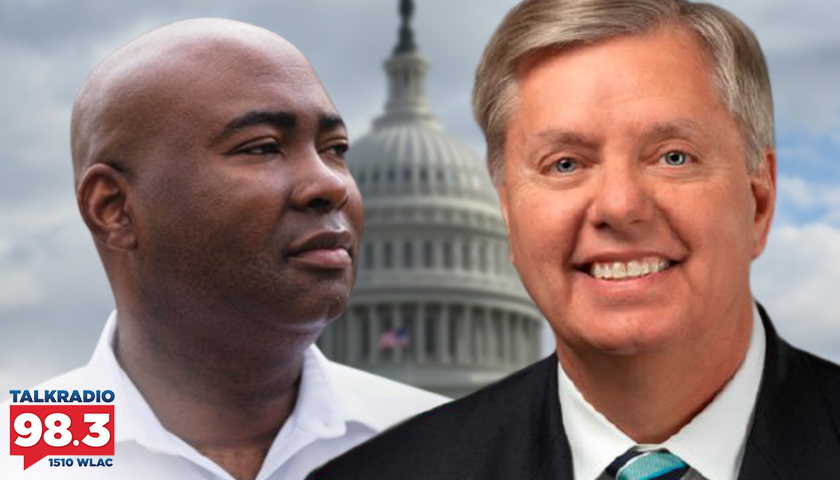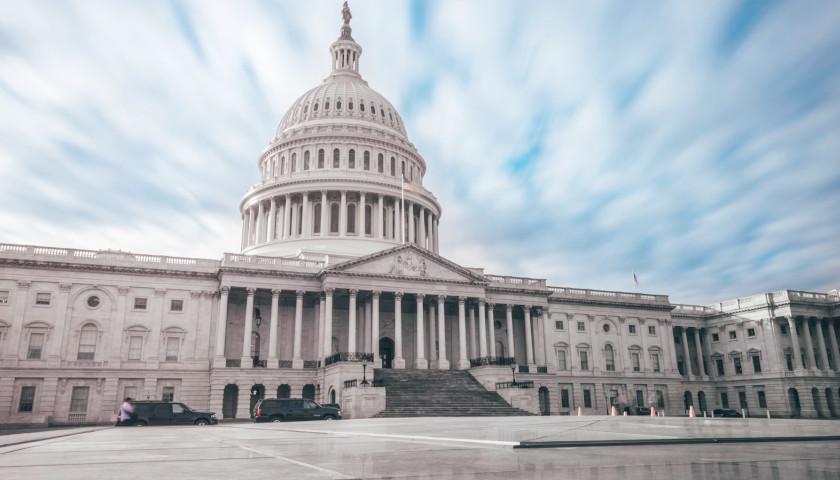Live from Music Row Tuesday morning on The Tennessee Star Report with Michael Patrick Leahy – broadcast on Nashville’s Talk Radio 98.3 and 1510 WLAC weekdays from 5:00 a.m. to 8:00 a.m. – host Leahy welcomed all-star panelist Clint Brewer to the studio.
During the third hour, Brewer weighed in on the Senate race between South Carolina Senator Lindsey Graham and his heavily funded left wing opponent Jamie Harrison. He added that 57 million dollars is a lot of money to be raised by Harrison in a state like South Carolina and that Act Blue was an extremely effective platform.
(Chuck Grassley clip plays)
I think that the Democrats realize how qualified this person is and they can in any way attack her there. So you heard a whole day of Democrats every one of them distracting and distorting because this nominee is so very well qualified to be on the court.
Leahy: That’s Senator Chuck Grassley of Iowa. He is the former chairman of the Senate judiciary committee. He was chairman during the Kavanaugh debacle where Kavanaugh was finally confirmed after all those false charges were made against him. That was back in the fall of 2018. two years later in 2020 Amy Coney-Barrett up for confirmation in the Senate Judiciary Committee hearings. The new chairman is Lindsey Graham of South Carolina. Clint, it looks like Lindsey Graham is determined to get this through to a vote this week and they’ll vote her out of committee and then onto the floor vote.
Brewer: That’s what it looks like. Graham does seem to be determined. He probably wants to get back home. He’s in a bit of a race to keep his seat.
Leahy: He is. Let’s talk about that a minute. He’s running against 44-year-old Jamie Harrison who’s kind of a far-left radical that’s his kind way to describe him. And he’s been a Democrat political operative. He was by the way for about five years he was a big lobbyist. He made a whole bunch of money as a lobbyist for the Podesta Group in Washington D.C. That’s how he made his money. The Podesta Group now obviously had all sorts of problems. They are not around anymore in any form because you know, there were some questions about that group.
But he made a bunch of money. Now speaking of money. Did you see this report? Now the polls show them pretty close to being tied, which is a surprise in South Carolina. And it seems to be a function of all the money that this Jamie Harrison guy has raised interestingly enough. It’s almost all coming from outside of South Carolina. It’s almost coming all coming through this fundraising Behemoth called Act Blue in the last quarter ending September 30th he raised wait for it, 57 million dollars.
Brewer: I’m not sure how you even spend 57 million dollars in a state as small as South Carolina. I mean, yeah, that’s like California money or Texas money or New York money. I mean that’s tough. I mean, I’m sure they’re I am sure the operatives there on the campaign will find a way to spend it all so their 15 percent flows back to them.
Leahy: Yeah, I would think so.
Brewer: But I mean that’s amazing. It’s not unheard of. You know, there are races Statewide races, even sometimes congressional seats that go national so to speak and become a source of national concern. We’ve seen that before and we’ve seen that in this state before.
Leahy: Bredesen got a lot of money but it wasn’t nearly at this scale.
Brewer: Well, the Bob Corker versus Harold Ford race, many years ago went national and and and you know, we thought it was an unheard-of sum of money with Ford bringing anywhere from 10 to 12 million dollars and at the time. Now the thing about South Carolina is you know, Graham is in a dead heat with this gentleman. And Trump is at about 50 percent in South Carolina. South Carolina can be a little more purple than people think. I think former President Obama hit it at like 45 percent.
Leahy: And I think the black percentage of voters is almost 30 percent.
Brewer: It is almost 30 percent. It’s up there. There are very few states that have a higher percentage of black voters. So it’s you know, it’s a little more purple. I think people think because it’s South Carolina and because it’s one of the original seats of the old Confederacy.
Leahy: That’s where that’s where it all started the Civil War.
Brewer: Yes. I mean, I think there’s a little bit of a false narrative about the politics in South Carolina. It’s a little more even than people think. But yeah, I think Graham wants to get this done so he can get back home and campaign.
Leahy: And he wants to be strong.
Brewer: Yes.
Leahy: And he wants to make sure that his With base realizes he helps get Amy Coney-Barrett on to the Supreme Court.
Brewer: That’s right. It helps him turn out his folk’s at the polls. It doesn’t look like the president’s really going to have any coattails in South Carolina since he’s only a 50 percent. He’s not really pulling in an overwhelming margin.
Leahy: And the black vote there, you know, typically that’s really I think a key. In 2016 he got eight percent of the black vote right now. There have been conflicting polls about what percentage of the black vote he’s going to get this year. I’ve seen polls In North Carolina shown 13 percent. other polls, I think a Zogby poll had him up to like 20 percent nationally. That’s really high. But now I’ve seen recent polls back down, you know much lower eight percent. That will be a key factor in South Carolina it seems to me.
Brewer: It will, and you know grams been in his seat for a long time and you know, the South Carolina voters are very familiar with him. I think for him the battle is to get his folks out. You know, there’s also a little bit of a divide in the polling. And if the polling is accurate, it means there’s a small slice of folks who are voting for President Trump, but not Senator Graham.
Leahy: So here’s what’s interesting about that is as you know, my colleague at Breitbart News James Pinkerton has written about a phenomenon he calls political colonization. And what he means by that is conservative states that Democratic candidates run against Republican candidates and they get almost all of their money from liberal donors in New York, LA, San Francisco, and Seattle. That appears to be going on in a big big way with this Jamie Harrison guy.
I looked at the data in his filing for the ending of June 30th. Now he’s done a filing on September 30th. We haven’t seen that data so we can’t break it down. He had 70,000 donors in his filing back in June, and we looked, of the 70,000 only 2,000 were from South Carolina and a whole bunch of them have given money through Act Blue. And about half of them from what we can tell were not employed. Hmm. How exactly does that work?
Brewer: Are they business owners? Are they independently wealthy?
Leahy: The question is, where’s that money coming from not employed people.
Brewer: Well, I hear you. To me, I think it’s an interesting question. to me the more interesting question is is the Republican party going to have an answer to Act Blue. What you’re talking about sort of is you know, a Soros Super PAC or something. What you’re talking about is essentially taking a race of national importance and crowdsourcing it. I mean, they’ve created a digital infrastructure that allows people of similar political beliefs to funnel their resources wherever the party feels is the most important.
It’s a fundraising platform. What happens is, you know, really since the first Obama election both parties have been in a bit of an arms race about digital technology. First, it was you know, Obama’s door-to-door technology and tracking votes in neighborhoods down to a micro-level. Now, we’re in a bit of a battle about online donations. And it sort of seesaws back and forth. And you know for all the criticism it receives Act Blue is really effective.
Leahy: Very effective. The question that a lot of people wanting is, how can so many people who don’t have jobs contribute, you know up to $2,000. bucks to these political campaigns? Well, how does that happen? Where is that money coming from people wonder?
Brewer: Great questions. All great questions. Who knows? I don’t know who the people are haven’t looked at it. I mean either they just do very well or something else.
Leahy: Yeah, something else. You know, we actually have reporters and all these states that are going to you know, where people are donating to Jamie Harrison. Tennessee, Virginia, Ohio, Minnesota, and Michigan. We’re actually going to go and if see their names are listed. We’re going to ask them.
Brewer: They should have an address.
Leahy: They have an address. We’re going to see if those people who are not employed in Tennessee, and there were like 200 from back in June not employed and don’t have a job. but have given money to Jamie Harrison. We’re going to talk to them and we’re going to kind of report to everybody. Hmm. How do they get that money?
Brewer: Mike it sounds like you’re prepared to commit an act of journalism.
Leahy: Can you believe it? An act of journalism these days.
Brewer: Stand back everyone.
Leahy: Watch out! An act of journalism is about to be committed here. It’s a dangerous time Clint for acts of journalism to be committed.
Listen to the third hour here:
– – –
Tune in weekdays from 5:00 – 8:00 a.m. to the Tennessee Star Report with Michael Patrick Leahy on Talk Radio 98.3 FM WLAC 1510. Listen online at iHeart Radio.
Photos “Jamie Harrison” by Jamie Harrison Twitter and “Lindsey Graham” by U.S. Senate. Background Photo “U.S. Capitol” by kidTruant CC BY 2.0.





